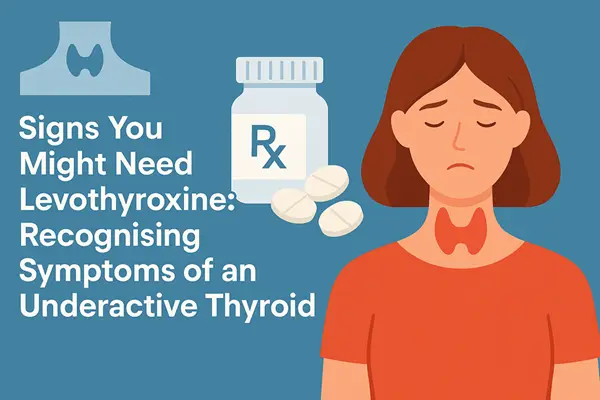An underactive thyroid, also known as hypothyroidism, can sneak up on you. The symptoms often develop slowly and are easy to overlook or attribute to stress, ageing, or lifestyle. But left untreated, it can affect your energy levels, mood, weight, and overall health.
If you’ve been feeling a little off lately, you might be wondering whether your thyroid could be to blame and whether Levothyroxine could help. In this post, we’ll explain the most common signs of an underactive thyroid and how Levothyroxine fits into treatment.
What is an underactive thyroid?
Your thyroid is a small gland located at the base of your neck. It produces hormones (primarily T4 and T3) that help regulate your metabolism, heart rate, body temperature, and more.
When the thyroid doesn’t produce enough of these hormones, your body slows down. This condition is called hypothyroidism. It’s more common in women, particularly over the age of 40, but it can affect anyone at any stage of life.
Common symptoms of an underactive Thyroid
Here are some of the most frequent signs to watch out for:
1. Fatigue that won’t go away
Feeling tired is common, but if you’re sleeping well and still exhausted throughout the day, your thyroid could be underactive. People often describe it as a deep, persistent tiredness that rest doesn’t fix.
2. Unexplained weight gain
If you’re putting on weight despite eating normally and being reasonably active, your slowed metabolism may be a sign of low thyroid hormone levels.
3. Cold sensitivity
Do you feel colder than others, even indoors or during mild weather? Hypothyroidism can affect your body’s ability to regulate temperature.
4. Dry skin and brittle hair
Thyroid hormones help keep your skin and hair healthy. A lack of them can lead to dry, flaky skin, brittle nails, and thinning hair.
5. Depression or low mood
Mood changes, including feeling low or more anxious than usual, are often linked to hormone imbalances, including those caused by thyroid problems.
6. Slow heart rate
A slower than normal heartbeat (bradycardia) can sometimes result from an underactive thyroid, though it’s often only spotted in a medical check-up.
7. Memory problems or ‘brain fog’
Difficulty concentrating, forgetfulness, or feeling mentally sluggish are classic signs that your thyroid may not be working properly.
8. Constipation
Thyroid hormones affect digestion too. If you’re struggling with sluggish bowels or frequent constipation, your thyroid could be playing a role.
9. Irregular or heavy periods
For women, hypothyroidism can cause changes in the menstrual cycle; heavy, more painful periods or less frequent ones.
How Levothyroxine helps
If a blood test confirms that you have low levels of thyroid hormone, your GP may prescribe Levothyroxine, or you can get Levothyroxine right here without a prescription! It’s a synthetic version of thyroxine (T4), the hormone your thyroid normally produces.
Levothyroxine helps restore your hormone levels to normal, which can relieve many of the symptoms listed above. It’s typically taken once daily, and most people find that their energy and mood begin to improve within a few weeks of starting treatment.
When to see your GP
If you recognise several of these symptoms in yourself, especially tiredness, weight gain, and low mood, it’s worth speaking to your GP. A simple blood test called a TSH test can usually confirm whether your thyroid is underactive.
Need Levothyroxine?
If you’ve been prescribed Levothyroxine and are looking for a safe, reliable way to get your weight loss medication online, our UK-registered pharmacy can help. We offer fast, discreet delivery and ongoing support to make managing your thyroid easier.
Final thoughts
An underactive thyroid can cause frustrating symptoms that impact your quality of life. The good news is that with the right diagnosis and treatment, often with levothyroxine, most people feel significantly better. Don’t ignore the signs; your energy, mood, and wellbeing could all be improved by getting your thyroid back in balance.



